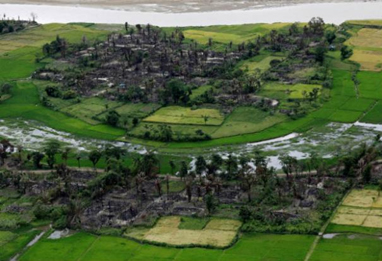YANGON, March 12, 2018 (BSS/AFP) – Myanmar is building security
installations on top of razed Rohingya villages, Amnesty International said
Monday, casting doubt on plans to repatriate hundreds of thousands of
refugees.
Nearly 700,000 Rohingya Muslims have fled northern Rakhine state to
Bangladesh since Myanmar launched a brutal crackdown on insurgents six months
ago that the US and UN have called ethnic cleansing.
Myanmar rejects that term, saying it was responding to attacks by the
Arakan Rohingya Salvation Army in late August.
But critics accuse the military of using the insurgent attacks to launch
disproportionate, scorched-earth “clearance operations” as a pretext to push
out the loathed minority.
The new Amnesty report, “Remaking Rakhine State”, uses satellite imagery
and interviews to point to a rapid increase in military infrastructure and
other construction since the start of the year that researchers say amounts
to a “land grab”.
“The new evidence and the rebuilding that Amnesty has documented in our
latest research shows that the Myanmar authorities are building over the top
of the very places the Rohingya need to return to,” Tirana Hassan, Amnesty’s
crisis response director, told AFP ahead of the report’s release on Monday.
“In some instances there has been the destruction of existing homes.”
Though admitting the images only paint a partial picture, the rights group
says structures for security forces, helipads and even roads have been built
in and around torched Rohingya properties.
Satellite imagery of one village called Kan Kya on the outskirts of
Rakhine’s Maungdaw town taken two months after the August attacks shows a
settlement scarred by fire.
But by early March buildings could be seen on the revamped land. Amnesty
believes they are part of a new base for security forces.
Similar building activity was also detected in Inn Din village, where
Myanmar has admitted that its security forces took part in the killings of 10
Rohingya residents in September.
Rakhine state has been largely sealed off from rights groups, the media
and UN investigators.
Myanmar and Bangladesh were supposed to start repatriating Rohingya
refugees in late January but many are reluctant to return to a place without
guarantees of basic rights and safety.
The report also highlights concerns that abandoned Rohingya land will be
set aside for ethnic Rakhine Buddhists and other non-Muslim groups in the
area, and that alterations to the landscape will erase evidence of alleged
atrocities by the military.
Zaw Htay, a government spokesman, rejected the claims, and said the
government was not basing military forces in residential areas but that
police stations were part of village construction plans.
“It’s not true that we are deploying the military among houses and among
villages,” he said, adding that bulldozing is necessary to work on burned
land. “As this region is behind in development, we are rebuilding
systematically.”



